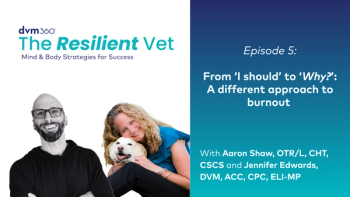
Do You Have Emotional Intelligence?
These factors indicate that someone possesses strong emotional intelligence — the ability to balance the emotional and rational parts of the brain. Do you have emotional intelligence?
Emotional intelligence is the distinct ability to balance the emotional and rational parts of the brain. Unlike an individual’s IQ, emotional intelligence isn’t about retaining knowledge, but rather how well someone can navigate the tangled web of emotional behaviors.
Veterinarians with high emotional intelligence are able to self-identify their own emotions and setbacks, allowing them to influence the emotions of others.
In a
RELATED:
- The Psychological Impact of Uncertainty: Why a Bigger IQ Isn't the Answer
- Strategies to Manage Stress in the Veterinary Practice
Personally, emotional intelligence can help strengthen leadership ability, navigate the difficulties of running a veterinary practice and successfully manage the personalities of employees.
During the hiring process, testing for emotional intelligence can pinpoint candidates who may be best suited for a position, or who may possess the strongest ability to learn and adapt.
Signs of Strong Emotional Intelligence
Empathy
Empathy is the ability to understand another person's experience from his or her perspective. Having empathy increases social awareness and manifests as the ability to be considerate of others.
People with high emotional intelligence tend to be curious about others and strive to relate to them. In the workplace, this translates into tailoring reactions or directions to a specific individual to achieve a shared goal or evade drama.
Having empathy is a fundamental tool for building strong relationships. People respond positively to those who consider their feelings or go the extra mile to engage.
Ability to Identify Emotions
The range of emotions someone can feel extends far beyond just feeling good or bad. People with strong emotional intelligence are able to differentiate between anxiety, irritability, optimism and contentment because they have better insight into how they feel and, more importantly, why they feel that way. As such, they are able to better control their reactions and recognize similar emotions in others.
Over time, the ability to identify emotions — and tailor actions accordingly — develops into a keen sense of social awareness. This includes the ability to read new acquaintances more quickly and become a better judge of character.
Understanding Personal Strengths and Weaknesses
While having emotional intelligence is an asset, those who possess it recognize their personal strengths and their weaknesses. They tend to be aware of the types of people and situations likely to aggravate them, as well.
On the flip side, people with strong emotional intelligence use their strengths to their full advantage to exceed expectations in the workplace.
Managing Stress
There are countless stressors the average person encounters on a regular basis. While many are unavoidable, it is possible to manage them effectively so they don’t impact work performance, attitude and reactions.
People with strong emotional intelligence don’t sweat the small stuff. They understand that holding a grudge or fixating on insignificant differences prolong their unnecessary feelings of anxiety or worry.
One sign of someone who has a high level of emotional intelligence is the ability to carve out personal time. This includes utilizing vacation days and regularly spending time detached from technology. Not only does powering down a smartphone or signing off an email account alleviate stress, it deters distractions that might otherwise inhibit productivity.
Strengthening Emotional Intelligence
Some people are inherently more emotionally intelligent than others, but it is still possible to enhance this trait. It will take significant self-reflection and practice to hone emotional intelligence, but implementing some of the following is a great place to start:
- Asking for feedback
- Being open to constructive criticism
- Not being afraid of rejection
- Finding stress relievers
- Learning from negative experiences
- Limiting time spent answering emails
- Networking with peers
- Observing professional weaknesses
- Reflecting on personal emotions
- Staying proactive, not reactive
- Utilizing allotted vacation days
Newsletter
From exam room tips to practice management insights, get trusted veterinary news delivered straight to your inbox—subscribe to dvm360.




